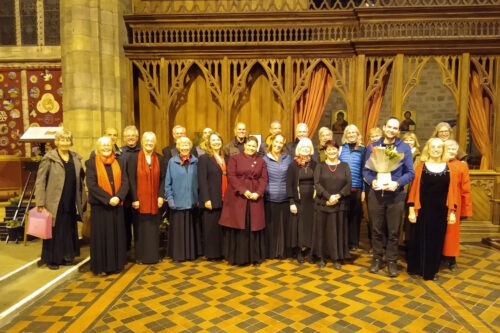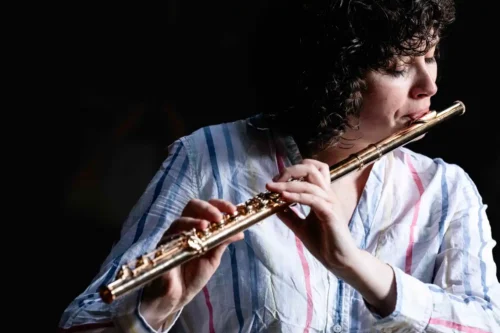 United Kingdom Corvedale Festival 2024 [2] – Various: Edge Chamber Choir (director: Ros Crouch), Joely Koos (cello), Wind players from Chetham’s School of Music (principal: Tom Redmond), Anna Kondrashina (flute). Corvedale Churches, 22 to 26.9.2024. (CK)
United Kingdom Corvedale Festival 2024 [2] – Various: Edge Chamber Choir (director: Ros Crouch), Joely Koos (cello), Wind players from Chetham’s School of Music (principal: Tom Redmond), Anna Kondrashina (flute). Corvedale Churches, 22 to 26.9.2024. (CK)

Rachmaninov – Vespers
Sunday afternoon at St Peter’s Church, Diddlebury brought a full house and a fine performance of Rachmaninov’s setting of the All-Night Vigil (commonly known as his Vespers) by the Edge Chamber Choir – a skilful group of just under thirty singers – under their Music Director, Ros Crouch. There were eloquent and committed solos from Steve Davis (tenor) and Laurelle Rond (Alto), and there were moments – the surge of tone towards the end of Bogoroditse Devo was one – that raised the neck-hairs as authentically Slavic voices would do.
Sally Beamish – Gala Water
Theo Gill – Vocalise
J.S. Bach – Cello Suite No.6
I have not seen or heard Joely Koos before, but I very much hope I shall do so again. Her cello recital was as emphatically individual as the architecture of All Saints Church, Culmington, which provided her with a stunning acoustic envelope.
She is a powerful communicator with both her voice and her instrument. Introducing Sally Beamish’s Gala Water, she did not merely tell us about the folk song it is based on: she sang it for us, unaccompanied, beautifully. She told us that Beamish wrote it in grief after a miscarriage; she asked us to imagine the music as an arch from sadness to consolation. In explaining the music for us technically, she enabled us to experience it viscerally. It moves through four Variations towards the discovery of the folk song – the music keening in the cello’s high register, powerfully felt in its deep tones: the emotion raw and palpable, at its most turbulent in Variation III, ending in a cut-off cry of pain. The pain is still there as Variation IV begins, but the emerging folk tune guides the music towards a moving resolution.
Vocalise was written by Joely’s son Theo, a Cambridge music graduate working in Beirut to establish music in schools operating in refugee camps. He had asked her to dedicate this performance to all displaced people, and Joely encouraged us to think of them as we listened. She described the music as subtle and haunting: as she vocalised wordlessly over a quiet but inexorable rhythmic pattern, the music took on an ominous character that put me in mind of Steve Reich’s Different Trains – trains carrying Jews to the death camps. Theo’s piece doesn’t really end, it winds down and fades to nothing.
Joely introduced Bach’s Sixth Cello Suite – the longest, I believe, and the most challenging – by referencing Steven Isserlis’s description of the six suites as stages in the life of Christ: here we finally reach uplift, Ascension. In this acoustic, her cello sounded wonderfully woody, resonant, vibrant, immediate; at times I almost felt that I was inside it. Joely’s joy as the Prelude got under way was infectious (it was possible to follow the music’s emotional trajectory by watching her face). Her playing of the elegant, dignified Allemande was flexible, contemplative, her cello booming in its lowest register; in the lively Courante she was enjoying every dip and dive in the cello’s flight. In her hands the Sarabande was searching for something beyond the here and now; the concluding Gigue was a big red balloon of a dance.
Paul Henley hailed the performance as an example of the miracle that can happen when music, performer and audience are fused in a total experience. Joely is an artist whose playing recognises no boundaries: her music is synonymous with her life; for her, performance is a mode of living. Such people are precious.
Franz Danzi – Wind Quintet in E-flat
Margaret Brouwer – Centennial Bells
James Grant – Homage
Hindemith – Morgenmusik
Weber – Huntsmen’s Chorus from Der Freischutz
Anon (arr. Nock) – Deep River
Lowell Shaw – 2 Fripperies
Arnold – Three Shanties
I missed Kate Allsop’s recital on recorders on Tuesday in St. Margaret’s Church, Abdon. Wednesday afternoon in St. Peter’s, Diddlesbury brought a musical interlude and an infusion of youth – Tom Redmond, Joint Principal of Chetham’s School of Music, brought a minibus-full of students to entertain us, and children from the local Primary School sat at the front of the audience. They began with one of Franz Danzi’s nine wind quintets: an engaging Allegro (with some nice runs for the bassoon – impressive breath control), a plangent minor-key Andante, a perky Menuetto & Trio and a lively 6/8 Allegro to finish.
A brass quintet (reinforced by a glockenspiel) chimed euphoniously in Margaret Brouwer’s minute-long Centennial Bells before playing contemporary American composer James Grant’s Homage, a luminous and hypnotic succession of slowly swelling and overlapping chords; music of quiet American grandeur, as if Copland or Roy Harris were somewhere just out of earshot. Sonorous and impressive in a different way was Hindemith’s Morgenmusik, first of four works depicting different times of day: it was designed to be played (like medieval German Turmmusik) ‘from the top of a tower’. Hindemith’s writing for the brass instruments is consistently beguiling: for me, the highlight of the concert.
I love the French horn, so a quartet of them in a church acoustic was close to heaven: just to hear them tuning together – what a wonderful sound! Weber’s Huntsmen’s Chorus is core Romantic horn repertory; and the spiritual Deep River, though not flawless (horns are hard to play), reminded us why Tippett used it at the end of his deeply moving A Child of Our Time. A couple of Lowell Shaw’s Fripperies made a nice contrast to end their set, the second of them using the Hornpipe as the basis of a jokey fugue.
Tom Redmond entertained us all with his demonstration of the length of tubing in a French horn: I shall not forget his description of horn playing as ‘like blowing out a candle from nine feet away’. The wind quintet returned to round off the programme with Malcolm Arnold’s well-known Three Shanties, deftly catching their whimsy, their dash and brilliance. And there was that bassoon again, doggedly trying to turn What Should We Do with a Drunken Sailor? into a Habanera.
Debussy – Syrinx
C.P.E. Bach – Sonata in A minor
Paul Henley – Intercession
Friedrich Kuhlau – Fantasie, Op.38 No.1
Eugene Bozza – Image
Sigfrid Karg-Elert – Caprice, Op.107 No.30 (Chaconne)
Ian Clarke – The Great Train Race

Paul Henley seems to have the ability to identify and invite young world-class musicians to Corvedale: the flute-player Anna Kondrashina, who gave a recital in Holy Trinity, Holdgate at lunchtime on Thursday is certainly one. She began Debussy’s Syrinx at the back of the church: as she moved forward, the sound of her flute filled the space, reminding us that every performance is an acoustical experience as well as a musical one. Her expressive playing of the Poco adagio of C.P.E. Bach’s Sonata in A minor (unusually, its three movements are slow/fast/fast) made it surprisingly close to Debussy’s soundworld; by the final Allegro we were firmly back in the style of his father J.S. Bach in his fourth Brandenburg Concerto, dispatched by Anna with agility and wit.
The world premiere of Paul Henley’s Intercession provided the concert’s still centre. It is anchored by a simple four-note phrase – you could sing Thy kingdom come or Thy will be done to it – which appears in many guises, while faster and more brilliant flights seem to depict bursts of passion, agitation, even ecstasy. As I listened to Anna’s sympathetic playing of Paul’s music, in this space, I was reminded of T.S. Eliot’s experience in Little Gidding – ‘a place where prayer has been valid’ – and of how such spaces can take us out of time and into the centuries-long continuum of prayer which is always now and which opens onto eternity. Later, in the early evening, this experience found an echo in Paul and Ruth’s second Contemplative Concert in the tiny Broadstone Chapel: Ruth singing unaccompanied, playing movements from Bach’s Cello Suites and from one of her husband’s, Paul reading poems by George Herbert, Anna Akhmatova and others.
Back to Anna’s recital: she followed Kuhlau’s Fantasie, Op.38 No.1 – a piece characterised by aspiring upward flights – with Eugene Bozza’s Image: a dazzling and technically fearsome workout, which of course she made light of. There was a lovely middle section; it took off like a (Mannheim) rocket at the end. Karg-Elert is best known for his organ music, particularly his showpiece Nun danket alle Gott; but, as with Brahms and the clarinettist Muhlfeld, a friendship with a woodwind player – in his case a flautist – brought a late harvest of works for flute, including this Caprice. Again, dazzling; and not too fanciful, perhaps, to imagine it as a piece for organ, pedal notes and all. As for Ian Clarke’s astonishing The Great Train Race, joyfully trashing technical limitations in the cause of onomatopoeic effects – it’s music, Jim, but not as we know it.
An extraordinary recital. I asked Anna if she had any connection with the great conductor Kirill Kondrashin, matchless in the symphonies of Shostakovich: he was her grandfather.
Chris Kettle
